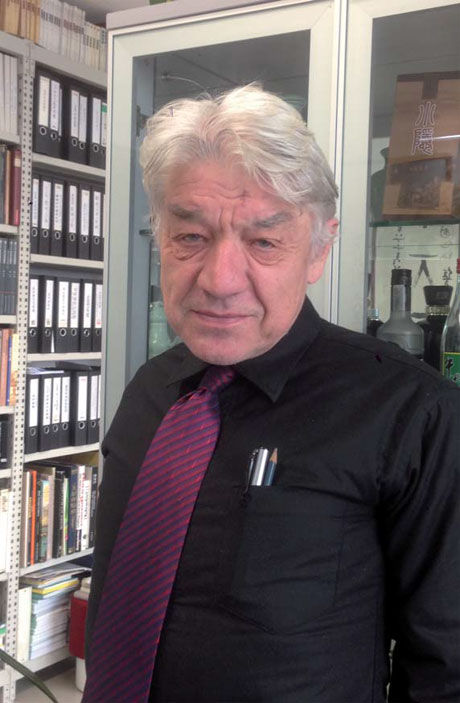Wisdom of sages and poet's inner self
Updated: 2016-01-08 07:57
By Zhou Wa(China Daily Europe)
|
|||||||||||
Renowned Sinologist urges Chinese writers to look for gems of knowledge in distant fields
For Wolfgang Kubin, studying Chinese literature sheds light not only on China, but on his inner self.
"It makes it clearer to me who I am, who I love and what I want from life," says Kubin, 70, a prominent European Sinologist.
|
Wolfgang Kubin, a German Sinologist, says that Chinese writers ought to work harder to improve their foreign language skills and nurture themselves with foreign literature. Zhou Wa / China Daily |
In that vein, Chinese writers ought to work harder to improve their foreign language skills and nurture themselves with foreign literature, he says.
Kubin, who has studied Chinese literature and culture for more than 40 years, is renowned for his translations in the 1990s of short stories and essays by Lu Xun.
Lu Xun is the pen name of the versatile writer Zhou Shuren (1881-1936), one of the first Chinese writers to use the vernacular instead of classical Chinese to create literature, and widely recognized as one of the founders of modern Chinese literature.

Ge Tao of the China-based Lu Xun Culture Foundation says: "Lu Xun's essays are often very incisive in his societal commentary. He is a master of irony, and that makes his works very difficult to translate."
However, Kubin has cracked this tough nut, and he has compiled six books of Lu Xun's works. For Kubin, Lu Xun is the preeminent Chinese writer.
Kubin also likes Li Bai (AD 701-762) of the Tang dynasty (618-907) and Su Shi (1037-1101) of the Song dynasty (960-1279), because they "have a strong ability with language, their thoughts are deep and wise and they fear nothing in life".
Li Bai, one of most prominent figures as Chinese poetry, came to be called the Fairy Poet because of his romantic works; and Su Shi, a major personality and a politician, is famous for his lyrics.
In Su's political struggles one of his constant companions was failure, and he was sent into exile more than once. His periods of political frustration proved particularly fruitful for him in the exercise of his literary talents.
However, such travails failed to dim the poet's enthusiasm and the optimism conveyed in his works, Kubin says.
"That is what he has taught me. ... They are fine models; I want to be like them."
Richard Trappl, director of the Confucius Institute at the University of Vienna, agrees with Kubin on the importance of mastering a foreign language.
"People can learn more about themselves through learning foreign languages. Looking beyond oneself offers another angle to look back at oneself."
Kubin has also compiled the History of Chinese Literature in the 20th Century (published in German as Geschichte der chinesischen Literatur im 20. Jahrhundert), which is widely considered indispensable and a classic.
He voices concern about contemporary Chinese literature, saying that writers of the era since 1949 have lacked profundity of thought and are too preoccupied with marketing.
"A writer who thinks of money or fame while writing cannot be called a writer at all. He's nothing more than a businessman. Before deciding to write, Chinese writers should ask themselves whether they really like Chinese literature itself. They should know what they want and who they are."
He also calls on Chinese writers to read more books, so they can convey the deep wisdom of classical Chinese literature through their own works.
Although Kubin is an influential Sinologist and can write poetry and prose in Chinese, he says he was by no means a top-flight student. He was lazy, procrastinated and was irresponsible until he was "enlightened" while reading the Bible when he was 16, he says.
He then threw himself into his work, in which two of the prime elements were self-discipline and determination. "I learned perseverance from Chinese writers like Su Shi. Before reaching your goals, you should stick to your ways."
To this day Kubin has retained that work ethic, he says, and that is illustrated in one of his pastimes, playing soccer, he says.
"In a game, if it's 3-0 with two minutes to go, I will still try my best. Actually in a game once we really did manage to get a draw in the last few minutes."
Today's Top News
Going mobile
Man with knife shot dead outside Paris police station
Trading halted after shares fall 7% in opening minutes
China voices its 'resolute opposition' to DPRK test
Design exhibition to attract Chinese art works
Germans shaken by mass attacks on women
Concerns grow over Saudi-Iranian rising tensions
Obama tightens gun rules, requires background check
Hot Topics
Lunar probe , China growth forecasts, Emission rules get tougher, China seen through 'colored lens', International board,
Editor's Picks

|

|

|

|

|

|







